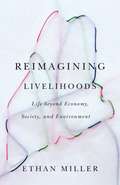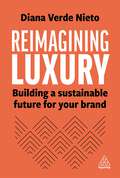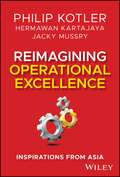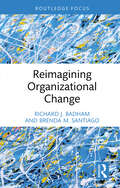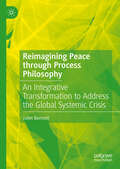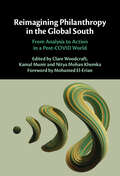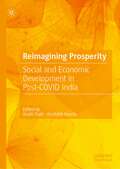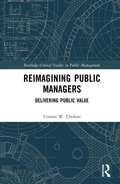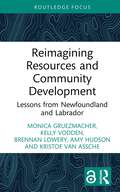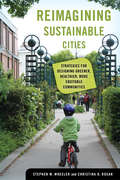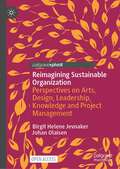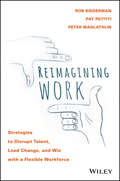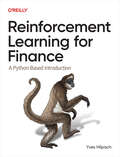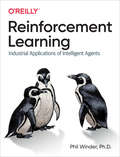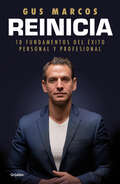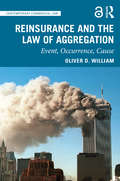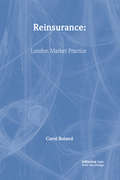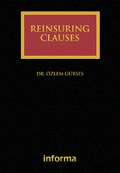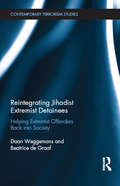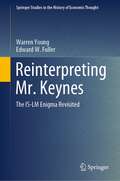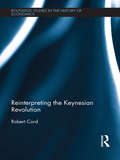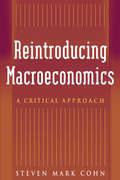- Table View
- List View
Reimagining Livelihoods: Life beyond Economy, Society, and Environment (Diverse Economies and Livable Worlds)
by Ethan MillerA provocative reassessment of the concepts underlying the struggle for sustainable developmentMuch of the debate over sustainable development revolves around how to balance the competing demands of economic development, social well-being, and environmental protection. &“Jobs vs. environment&” is only one of the many forms that such struggles take. But what if the very terms of this debate are part of the problem? Reimagining Livelihoods argues that the &“hegemonic trio&” of economy, society, and environment not only fails to describe the actual world around us but poses a tremendous obstacle to enacting a truly sustainable future.In a rich blend of ethnography and theory, Reimagining Livelihoods engages with questions of development in the state of Maine to trace the dangerous effects of contemporary stories that simplify and domesticate conflict. As in so many other places around the world, the trio of economy, society, and environment in Maine produces a particular space of &“common sense&” within which struggles over life and livelihood unfold. Yet the terms of engagement embodied by this trio are neither innocent nor inevitable. It is a contingent, historically produced configuration, born from the throes of capitalist industrialism and colonialism. Drawing in part on his own participation in the struggle over the Plum Creek Corporation&’s &“concept plan&” for a major resort development on the shores of Moosehead Lake in northern Maine, Ethan Miller articulates a rich framework for engaging with the ethical and political challenges of building ecological livelihoods among diverse human and nonhuman communities. In seeking a pathway for transformative thought that is both critical and affirmative, Reimagining Livelihoods provides new frames of reference for living together on an increasingly volatile Earth.
Reimagining Luxury: Building a Sustainable Future for your Brand
by Diana Verde NietoIt has never been more important for the luxury industry to embrace sustainability and transform their businesses for a better future. However, in order to become authentically sustainable, companies need to shift their mindsets. Reimagining Luxury offers invaluable guidance for businesses seeking to thrive in a sustainable future. Authored by Diana Verde Nieto, an expert in the field, and incorporating insights from industry leaders such as LVMH, L'Oreal, and Kering, as well as respected figures like Harvard Professor John Kotter and former Unilever CEO Paul Polman. This comprehensive guide provides practical advice on how to shift mindsets, heartsets and practices to achieve sustainable economic growth. Whether you're an established luxury organization or a new player in the field, this book is an essential resource for navigating the changing landscape of sustainability and innovation in the 21st century. Reimagining Luxury empowers 'the reimaginers' to take action and create change by offering practical frameworks and concrete examples. Whether you are an industry professional with years of experience or just starting out, the book will help accelerate your path towards positive change. Covering everything from environmental and social topics to positive storytelling, Reimagining Luxury offers readers a deeper understanding of the interconnectedness of these issues and the steps necessary to address them holistically. The author, Verde Nieto, brings a wealth of knowledge and practical experience to the table as an Adviser at Sustainnovate and Co-Founder of Positive Luxury. Readers can trust that the advice presented is based on both deep expertise and practical experience. If your goal is to embrace sustainable innovation as a catalyst of social and economic growth, then Reimagining Luxury is a must-read.
Reimagining Operational Excellence: Inspirations from Asia
by Philip Kotler Hermawan Kartajaya Jacky MussryExplore the cutting-edge of marketing new products and services from leading businesses in Asia In Reimagining Operational Excellence: Inspirations From Asia, world-renowned marketing guru and bestselling author Philip Kotler delivers a groundbreaking book unveiling the transformative marketing strategies that have propelled Asia to the forefront of the global business arena. In this insightful text, Kotler explores the dynamic competition between Asia and the global West, revealing how it has catalyzed Asia's adoption of incisive and effective marketing practices. The book delves into various dimensions of marketing operations, including quality, cost, delivery, service, creativity, and innovation, highlighting the crucial role of entrepreneurship and leadership in achieving operational excellence. Kotler's analysis extends to significant developments within the global business ecosystem, showcasing how countries like Singapore, Japan, Korea, India, and China are redefining business efficiency and continuous improvement. You'll also find In-depth examinations of China's unique and competitive economic ecosystem Discussions of the increasingly foundational role played by Singapore as an international business hub An analysis of the latest economic developments in South Korea driving marketing excellence in that country Reimagining Operational Excellence: Inspirations From Asia is an essential guide for anyone involved in marketing, advertising, business operations, or entrepreneurship. This book is not just an analysis of Asian marketing prowess; it's a blueprint for harnessing these strategies to drive business growth and success in today's rapidly changing global market.
Reimagining Organizational Change (Routledge Focus on Business and Management)
by Richard J. Badham Brenda M. SantiagoThis engaging and thought-provoking book offers a rich, multifaceted approach to mastering leadership and driving organizational change. With its extensive, playful and insightful use of cartoons, thought-provoking debriefs, and practical self-assessments, the book is designed to be not only a guide but an experience, turning the often-complex topics of leadership and change into accessible, memorable images. Each chapter is filled with illustrations that not only lighten the mood but also provide deeper insights into the psychological and organizational dynamics at play in bringing about change.At the heart of the book lies a comprehensive and dynamic 5M framework that reimagines the change process as the Mindful Mobilization of Maps, Masks, and Mirrors. This framework is designed to challenge traditional approaches to change, offering fresh perspectives on how to navigate the often murky waters of organizational transformation.Whether you are a student looking to navigate the complexities of organizational theory, a consultant seeking fresh strategies to introduce and communicate change, or a lecturer hoping to inspire your students with innovative teaching methods, this book provides an entertaining, insightful and memorable resource and guide.
Reimagining Peace through Process Philosophy: An Integrative Transformation to Address the Global Systemic Crisis
by Juliet BennettThis book explores the ways in which process philosophers extend and strengthen peace scholars’ outlines of a paradigm of/for peace. It then illustrates the value of such a peace paradigm through the example of the climate breakdown, showing how process thinking and process metaphysics intervene at the roots of a global systemic crisis. In doing so, it articulates a new inroad to process philosophy, and illuminates an integrative intervention in the systemic crises of climate change and global inequality. The “static-process framework” developed in this book makes the philosophy of Alfred North Whitehead and the fields he has inspired easier to grasp, and offers a tool to assist in the application of process thought to a multitude of issues. This framework depicts tensions between two modes of thought—static and process thinking—according to five “basic orientations”: abstract/context, closed/open, isolating/relational; passive/generative; one/multi-dimensional. This pattern is mapped across the domains of metaphysics, economics, politics and as the basis for a new mode of living and organising across multiple layers of society.
Reimagining Philanthropy in the Global South: From Analysis to Action in a Post-COVID World
by Nitya Mohan Khemka Clare Woodcraft Kamal MunirWhile there have always been high levels of philanthropic giving in the Global South, the urgency and unexpectedness of COVID-19 transformed the parameters within which philanthropy operates. 'Reimagining Philanthropy in the Global South' examines how newer models of philanthropy are tackling development challenges, including poverty, inequality and access to healthcare and education, and questions how organisations are coping with structural changes in donor-driven philanthropy; how changes in traditional grant making are impacting the imperatives of recipient organisations; and how indigenous philanthropy is making a difference. The chapters provide frank assessments of the priorities, challenges and opportunities of emerging market philanthropy, and the lessons learned from the pandemic. The authors highlight the deeper issues at play, as well as offering ideas and positive examples of how diverse stakeholders are coming together to solve social challenges in creative and practical ways. This title is also available as Open Access on Cambridge Core.
Reimagining Prosperity: Social and Economic Development in Post-COVID India
by Amitabh Kundu Arash FazliThis book explores the second-order effects of the COVID-19 pandemic on social and economic development in India. The chapters in this volume provide theoretical perspectives and empirical insights from a range of disciplines including history, economics, water management, food and nutrition security, agriculture, rural management, public health, urbanization, gender studies and development of the marginalized. It discusses the pressing questions that have been raised by the disruption caused by the pandemic and proposes insights and interventions to build a more just, sustainable and united post-COVID India.
Reimagining Public Managers: Delivering Public Value (Routledge Critical Studies in Public Management)
by Usman W. ChohanPublic value theory speaks to the co-creation of value between politicians, citizens, and public managers, with a focus on the public manager in terms of her contributions, initiatives, and limitations in value creation. But just who are public managers? Public value regularly treats the "public manager" as synonymous with bureaucrat, government official, civil servant, or public administrator. However, the categories of public managers represent a more versatile and expansive set of agents in society than they are given credit for, and the discourse of public value has typically not delved sufficiently into the variety of possible cadres that might comprise the "public manager." This book seeks to go beyond the assumed understandings of who the public manager is and what she does. It does so by examining the processes of value creation that are driven by non-traditional sets of public managers, which include the judiciary, the armed forces, multilateral institutions, and central banks. It applies public value tools to understand their value creation and uses their unique attributes to inform our understanding of public value theory. Tailored to an audience comprising public administration scholars, students of government, public officials, practitioners, and social scientists interested in contemporary problems of values in society, this book helps to advance public administration thought by re-examining the theory’s ultimate protagonist: the public manager. It therefore constitutes an important effort to take public value theory forward by going "beyond" conceptions of the public manager as she has thus far been understood.
Reimagining Resources and Community Development: Lessons from Newfoundland and Labrador (Earthscan Studies in Natural Resource Management)
by Kelly Vodden Kristof Van Assche Monica Gruezmacher Brennan Lowery Amy HudsonThis book analyzes the experiences of communities facing major challenges relating to resource dependency and community sustainability, drawing on specific examples from the Canadian province of Newfoundland and Labrador. It offers a methodology of self-analysis for communities facing similar challenges, inspired by the ups and downs, local strategies for self-analysis, and collaborative work toward new futures in this Canadian province.Life in hundreds of small coastal settlements revolved around the cod fishery, until the fishery was no more viable. Communities have had to rethink their strengths, reconsider their assets, and imagine potential futures in the wake of events such as colonization and the collapse of the fishing industry. Their experiences are relevant for other parts of the world where formerly central resources are depleted or lose their value, and communities face the need for transition. The capacity to imagine different futures is rooted in the ability to critically consider strengths and weaknesses alike. The authors skillfully dissect and illuminate the conditions that can enable the reconsideration of local assets and narratives, toward a more sustainable future. The variety of these conditions, ranging from social memory to public debate, policy tools and institutional capacity, decision arenas, paths for participation, and distributed strategic leadership, are laid out clearly and illustrated vividly through vignettes written by individuals who participated in the events described. This book culminates in a flexible yet clearly structured method of self-analysis, useful for communities interested in rethinking their strengths and working toward new futures.This book will appeal to students, scholars, and professionals interested in community development and redevelopment and offers a new understanding of the mechanics of local and regional resilience
Reimagining Sustainable Cities: Strategies for Designing Greener, Healthier, More Equitable Communities
by Stephen M. WheelerA cutting-edge, solutions-oriented analysis of how we can reimagine cities around the world to build sustainable futures. What would it take to make urban places greener, more affordable, more equitable, and healthier for everyone? In recent years, cities have stepped up efforts to address climate and sustainability crises. But progress has not been fast enough or gone deep enough. If communities are to thrive in the future, we need to quickly imagine and implement an entirely new approach to urban development: one that is centered on equity and rethinks social, political, and economic systems as well as urban designs. With attention to this need for structural change, Reimagining Sustainable Cities advocates for a community-informed model of racially, economically, and socially just cities and regions. The book aims to rethink urban sustainability for a new era. In Reimagining Sustainable Cities, Stephen M. Wheeler and Christina D. Rosan ask big-picture questions of interest to readers worldwide: How do we get to carbon neutrality? How do we adapt to a climate-changed world? How can we create affordable, inclusive, and equitable cities? While many books dwell on the analysis of problems, Reimagining Sustainable Cities prioritizes solutions-oriented thinking—surveying historical trends, providing examples of constructive action worldwide, and outlining alternative problem-solving strategies. Wheeler and Rosan use a social ecology lens and draw perspectives from multiple disciplines. Positive, readable, and constructive in tone, Reimagining Sustainable Cities identifies actions ranging from urban design to institutional restructuring that can bring about fundamental change and prepare us for the challenges ahead.
Reimagining Sustainable Organization: Perspectives on Arts, Design, Leadership, Knowledge and Project Management
by Birgit Helene Jevnaker Johan OlaisenThis open access book reimagines a deeper sustainability in dynamic organization. Offering multiple perspectives on arts, design thinking, leadership, knowledge and project management, Reimagining Sustainable Organization addresses our need for thinking and coping differently when facing the many unknowns of real-life enterprises in society. Drawing on process philosophy, real-world case studies, and examinations of business practices as well as management research, the authors explore knowledge creation towards reimagining sustainable organization. The book includes frameworks and conceptual tools as well as insights for further explorations. This book will be of interests to students, scholars and teachers, and practitioners who are studying sustainable organization, greener management, leadership ideas, or knowledge and project management. It covers future pressing issues also for the professionals involved in co-creative work across organizational boundaries. This is an open access book.
Reimagining Work Life: Keeping Talented Women on the Road to Success
by Sylvia Ann HewlettAccording to the author, there are six essential elements that need to gain real traction if a company is to fully realize female talent over the long haul. This chapter focuses on one of these elements, illustrating ways in which companies are beginning to honor and support work-life challenges that go beyond biological children and the nuclear family.
Reimagining Work: Strategies to Disrupt Talent, Lead Change, and Win with a Flexible Workforce
by Rob Biederman Pat Petitti Peter MaglathlinThrive in the new economy by leading ahead of the next evolution Reimagining Work is the business leader's guide to surviving—and thriving—in the new on-demand economy. As the business and workplace environments evolve, traditional management strategies are becoming obsolete; the skilled workforce demands flexibility and more control over their work—things that the major corporations repeatedly fail to offer. Is it any wonder that the best and brightest talent is increasingly moving toward smaller companies with alternative management structures? Companies like Uber, Lyft, Handy, and Task Rabbit? These businesses have seen major success by attracting the right people—by giving them what they want. As the shift continues, businesses will need to change the way they recruit, develop, and train talent. This book shows you how to restructure and reconfigure your current strategy toward one that will help your business not just survive, but grow stronger in this new environment by offering what top talent demands. Niche spaces like transportation and general labor may have catalyzed the movement toward on-demand, but their influence is spreading and traditional businesses must adapt or die. This book shows you how to turn the shift into an asset for your company by leading through change for the better. Reconsider your current talent sourcing strategies Update your team development and training programs Build a flexible workforce that thrives in the "on-demand" economy Develop your business to succeed amidst the changing business paradigm Growth is more than just expansion; it's also maturation, adaptation, and evolution. Our economy is on the cusp of a seismic shift, and smart businesses will implement change early before the obsolete start falling behind. Reimagining Work gives you actionable guidance for staying ahead of the curve.
Rein Chemical Co.: Specialty Division
by Francis J. AguilarThis case describes corporate management's recent discovery of widespread unethical pricing transactions in one division and key managers' different views on how to respond. Students are asked to evaluate management's position and decide who should do what to resolve Rein Chemical Co.'s problem. The improper pricing problem, involving an undetermined large number of customers, is complicated by the lack of clarity as to who the injured parties were and by the harm that any course of action could have on innocent parties.
Reinforcement Learning for Finance: A Python-Based Introduction
by Yves J. HilpischReinforcement learning (RL) has led to several breakthroughs in AI. The use of the Q-learning (DQL) algorithm alone has helped people develop agents that play arcade games and board games at a superhuman level. More recently, RL, DQL, and similar methods have gained popularity in publications related to financial research.This book is among the first to explore the use of reinforcement learning methods in finance.Author Yves Hilpisch, founder and CEO of The Python Quants, provides the background you need in concise fashion. ML practitioners, financial traders, portfolio managers, strategists, and analysts will focus on the implementation of these algorithms in the form of self-contained Python code and the application to important financial problems.This book covers:Reinforcement learningDeep Q-learningPython implementations of these algorithmsHow to apply the algorithms to financial problems such as algorithmic trading, dynamic hedging, and dynamic asset allocationThis book is the ideal reference on this topic. You'll read it once, change the examples according to your needs or ideas, and refer to it whenever you work with RL for finance.Dr. Yves Hilpisch is founder and CEO of The Python Quants, a group that focuses on the use of open source technologies for financial data science, AI, asset management, algorithmic trading, and computational finance.
Reinforcement Learning: Industrial Applications Of Intelligent Agents
by Phil WinderReinforcement learning (RL) will deliver one of the biggest breakthroughs in AI over the next decade, enabling algorithms to learn from their environment to achieve arbitrary goals. This exciting development avoids constraints found in traditional machine learning (ML) algorithms. This practical book shows data science and AI professionals how to learn by reinforcement and enable a machine to learn by itself.Author Phil Winder of Winder Research covers everything from basic building blocks to state-of-the-art practices. You'll explore the current state of RL, focus on industrial applications, learn numerous algorithms, and benefit from dedicated chapters on deploying RL solutions to production. This is no cookbook; doesn't shy away from math and expects familiarity with ML.Learn what RL is and how the algorithms help solve problemsBecome grounded in RL fundamentals including Markov decision processes, dynamic programming, and temporal difference learningDive deep into a range of value and policy gradient methodsApply advanced RL solutions such as meta learning, hierarchical learning, multi-agent, and imitation learningUnderstand cutting-edge deep RL algorithms including Rainbow, PPO, TD3, SAC, and moreGet practical examples through the accompanying website
Reinicia: 10 fundamentos del éxito personal y profesional
by Gus Marcos¿Un emprendedor nace o se hace? ¿Cuál es el arquetipo del emprendedor? ¿Qué significa el éxito para un emprendedor? ¿Qué habilidades son esenciales para alcanzar el éxito? ¿Se puede ir tras el sueño de un proyecto sin descuidar la salud y la familia? ¿Cómo capitalizar los aprendizajes de la vida personal para impulsar la profesional y viceversa? Emprender es una forma de vida. Construir un negocio y alcanzar el bienestar es una misión que exige lo mejor de nosotros. El camino nos pone a prueba y a la meta solo llegan aquellos dispuestos a enfrentar la incertidumbre y hacer los sacrificios necesarios para ver realizado su sueño. Gus Marcos, emprendedor serial y líder de negocios en México, responde en este libro todas estas preguntas a través de las anécdotas y los aprendizajes que ha acumulado como empresario durante más de una década. En estas páginas, escritas con la misma convicción con la que Gus afronta cada uno de sus proyectos, encontrarás lo que para él son los 10 fundamentosdel éxito tanto en la vida privada como en la laboral. Sus principios inspirarán tanto a emprendedores como a aquellos que aún no se deciden a seguir sus sueños y buscan motivación, y se basan en una idea clave: hay que reiniciar la vida con un nuevo mindset para llegar a los lugares más prósperos.
Reinsurance Arbitrations
by Kyriaki NoussiaFollowing events such as the 2008 credit crunch and financial crisis, many sectors of the economy suffered; nevertheless, reinsurance managed to maintain its strong position in the market industry and the global economic arena. Arbitration has traditionally been used in reinsurance, due in no small part to its effective, time- and cost-efficient nature. Hence, reinsurance contracts often include arbitration clauses requiring that any and all disputes arising under the contract be resolved by arbitration. The current work provides an in-depth treatment of reinsurance arbitrations and the various issues they entail in the most representative jurisdictions for such arbitrations. It also aims to pave the way for future directions of arbitration in the context of reinsurance. Any participant in the reinsurance market arena looking for a roadmap to the fascinating legal environment in which reinsurance arbitrations operate would be well advised to have this book on hand.
Reinsurance and the Law of Aggregation: Event, Occurrence, Cause (Contemporary Commercial Law)
by Oliver D. WilliamIn excess of loss reinsurance, the reinsurer covers the amount of a loss exceeding the policy’s deductible but not piercing its cover limit. Accordingly, a policy’s quantitative scope of cover is significantly affected by the parties’ agreement of a deductible and a cover limit. Yet, the examination of whether a loss has exceeded deductible or cover limit necessitates an educated understanding of what constitutes one loss. In so-called aggregation clauses, the parties to (re-)insurance contracts regularly provide that multiple individual losses are to be added together for presenting one loss to the reinsurer when they arise from the same event, occurrence, catastrophe, cause or accident. Aggregation mechanisms are one of the core instruments for structuring reinsurance contracts. This book systematically examines each element of an aggregation mechanism, tracing the inconsistent usage of aggregation language in the markets and scrutinizing the tests developed by courts and arbitral tribunals. In doing so, it seeks to support insurers, reinsurers, brokers and lawyers in drafting aggregation clauses and in settling claims. Focusing on an analysis of primary sources, particularly judicial decisions, the book interprets each judicial decision to describe a system of inter-related rules, collating, organising and describing the English law of aggregation as applied by the courts and arbitral tribunals. It further draws a comparison between the English position and the corresponding rules in the Principles of Reinsurance Contract Law (PRICL).
Reinsurance: London Market Practice
by Carol BolandThis is a useful handbook for anyone involved in the current London Market. It leads the insurance professional through all aspects of reinsurance practice from the development of reinsurance to the methods used including: risk placement, legal contracts, policy wordings, accounting, claims and run-off. It uses charts, forms and diagrams to show many aspects of reinsurance practice. Full appendices are included giving examples of slips, cover wordings and key clauses.
Reinsuring Clauses (Lloyd's Insurance Law Library)
by Ozlem GursesThis book provides a comparative English/US law study of the operation of facultative reinsurance contracts. Most of the reinsurance litigation in England and the US has involved this type of contract, and there are regular arbitrations and judicial proceedings in the leading common law jurisdictions to which this book will be relevant. The book is concerned with: • The legal nature of reinsurance agreements • The means whereby terms of reinsurance policies can be derived or incorporated from underlying insurances • The effect on reinsurance of judgments, awards and settlements against the reinsured • The operation of claims provisions
Reintegrating Jihadist Extremist Detainees: Helping Extremist Offenders Back into Society (Contemporary Terrorism Studies)
by Daan Weggemans Beatrice de GraafThis book seeks to understand the processes of reintegration of former Jihadist detainees, as well as the role that the police and other frontline professionals play in this process. Over the past few decades the number of people who have been detained under the suspicion of terrorist activities has grown significantly. This has resulted in an increased scholarly interest in the topic of prisons and terrorism. However, the main focus of academic research has been on the period of incarceration with researchers paying extensive attention to the conditions under which terrorists have been detained as well as to various processes of alienation and (violent) radicalisation that sometimes take root while in prison. Much less has been written about the period after their incarceration and the steps being taken to prepare them for that transition. This book seeks to fill this gap. It argues that sentencing or incarcerating terrorism suspects is not the end of the story, but just the beginning of the next phase: a process of reintegration, or the start of a new cycle of violence. This exploratory study outlines the factors during and after detention that contribute or hinder the reintegration of those who have been incarcerated for violent extremism and terrorism. The overriding aim of this work is to facilitate further research into the radicalisation and de-radicalisation of jihadist suspects. This book will be of much interest to students of terrorism and counter-terrorism, Islamist radicalisation, criminology and security studies in general.
Reinterpreting Mr. Keynes: The IS-LM Enigma Revisited (Springer Studies in the History of Economic Thought)
by Warren Young Edward W. FullerThis book examines the origins of the IS-LM model, one of the most significant innovations in the history of economic thought. It shows that the complete IS-LM model, including the equations and diagram, was produced by a group of economists who contributed their respective mathematical models of Keynes’s General Theory, including Champernowne, Reddaway, Harrod, and Meade, not to mention Hicks. Furthermore, the book discusses the implications of newly discovered archival material, including a previously overlooked document showing that John Maynard Keynes himself was the first to present the IS-LM model equations in a lecture he gave on December 4, 1933. It focuses on the implications of this material in terms of understanding the evolution of Keynes’s approach from 1933 to 1937, later interpreters of his General Theory, and the ongoing debate between Keynesians and Post-Keynesians on the nature of his system. Given the revelations it presents, this book will transform the profession’s understanding of the origins of the IS-LM model and modern macroeconomics.
Reinterpreting The Keynesian Revolution (Routledge Studies in the History of Economics)
by Robert CordVarious explanations have been put forward as to why the Keynesian Revolution in economics in the 1930s and 1940s took place. Some of these point to the temporal relevance of John Maynard Keynes's The General Theory of Employment, Interest, and Money (1936), appearing, as it did, just a handful of years after the onset of the Great Depression, whilst others highlight the importance of more anecdotal evidence, such as Keynes’s close relations with the Cambridge ‘Circus’, a group of able, young Cambridge economists who dissected and assisted Keynes in developing crucial ideas in the years leading up to the General Theory. However, no systematic effort has been made to bring together these and other factors to examine them from a sociology of science perspective. This book fills this gap by taking its cue from a well-established tradition of work from history of science studies devoted to identifying the intellectual, technical, institutional, psychological and financial factors which help to explain why certain research schools are successful and why others fail. This approach, it turns out, provides a coherent account of why the revolution in macroeconomics was ‘Keynesian’ and why, on a related note, Keynes was able to see off contemporary competitor theorists, notably Friedrich von Hayek and Michal Kalecki.
Reintroducing Macroeconomics: A Critical Approach
by Steven Mark CohnThis lively introduction to heterodox economics provides a balanced critique of the standard introductory macroeconomic curriculum. In clear and accessible prose, it explains many of the key principles that underlie a variety of alternative theoretical perspectives (including institutionalist economics, radical economics, Post Keynesian economics, feminist economics, ecological economics, Marxist economics, social economics, and socioeconomics). Because the book's structure parallels the chapters and subject matter presented in a typical introductory macroeconomics textbook, "Reintroducing Macroeconomics" provides readers with a running commentary on the standard approach, while simultaneously introducing them to a broader range of ideas about the causes and appropriate policy responses to a wide range of common economic problems. Although designed primarily as a companion volume for students in introductory economics courses, the book can also be used effectively for more targeted applications that highlight a particular economic issue or approach. It will be of particular interest to students in related disciplines (such as American Studies, anthropology, black studies, environmental studies, gender studies, history, political science, and sociology) who may be required to take introductory economics classes and who are interested in gaining an alternative perspective. By demonstrating the vitality and common ground underlying a broad spectrum of heterodox approaches, "Reintroducing Macroeconomics" brings alternative perspectives into the classroom in an accessible way that empowers students to think about the economy in new and exciting ways. The text includes end-of-chapter study questions, as well as a detailed note to instructors.
